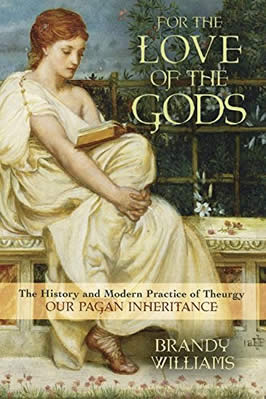[Author’s Note: Let’s get this out of the way first — I have been acquainted with Brandy Williams for a good 25 years, and know her to be a first-class scholar of all things Pagan and/or magical. So when she offered to send me a PDF of this, her magnum opus, in exchange for reviewing it, I was all Yes! Yes! I was not disappointed.]

There have been a rash of more or less scholarly books about the origins of modern witchcraft, Wicca, etc., in recent years, most of them focusing on old gossip about the founders of various modern Traditions. For the Love of the Gods is nothing like these.
Spanning thousands of years and at least a dozen influential philosophers from ancient Egypt to modern times, it weaves a tapestry of lives and ideas into a coherent history of the Western Mystery Tradition, and ultimately into a modern practice of Theurgy. Also unlike most books, Brandy Williams makes it abundantly clear just how much women contributed, and continue to contribute, to both Theurgy and philosophy. There were many, many more than just Hypatia!
So what does Theurgy mean and how is it related to that dry, old intellectual pastime, philosophy? Here’s where it gets interesting: Theurgy, literally ‘god-work,’ is a magical and spiritual practice aimed at bringing oneself into communion with gods and enabling one to work with them in the Great Work of… how shall I put this… running the Universe. Philosophy, literally “love of wisdom,” is both an approach to Theurgy and a way to comprehend that Universe. And in both Theurgy and philosophy, the first tenet is to deeply know oneself.
Sounds a bit overwhelming, doesn’t it? Not the way Brandy Williams tells it. Starting with a priestess of Ma’at and Amun in ancient Egypt, For the Love of the Gods brings to life the stories of those who brought the work of the gods forward through time and many tribulations that we might benefit from it. Interwoven with these brilliantly-told stories are the contexts within which these priests, priestesses, magicians and philosophers lived and worked: the prevailing political, cultural, and religious spirit of each time and place and what it has for us. Williams makes it startlingly clear that thanks to the philosophers, who were deemed intellectual and therefore respectable, Paganism never actually died out. We are all their inheritors and descendants.

Once we’ve been brought up to modern times, For the Love of the Gods switches gears: now we’re talking not about what was, but what is and can be. Part Two is, in effect, a grimoire. It begins with study: not just what to study but how to study as a theurgist. From there it introduces a number of practices, meditations, and rituals, a few of which are:
- Meditation to Clear Thought
- Ritual of Honoring the Ancestors
- Ritual of Devotional to a Deity
- Ritual to Animate a Statue
- Ritual to Call the Personal Daimon
- Rituals of Invoking Deity into Another or Yourself
I know you hear this from teachers all the time, but trust me, it’s important: do not just plunge right into the workings without having absorbed the philosophy. You won’t get the results you want, or much of any at all. And as one of the great – if maverick – theurgists taught, part of the Work is divorcing oneself from what he called ‘lust of result’ – the pursuit of the goal over the journey, the ‘eye on the prize’ outlook of too much of today’s culture. The pursuit of Theurgy is the prize.
For the Love of the Gods is in my opinion one of the finest books – I was going to say ‘of its kind’ but there are really none like it – I have ever read. It’s a long and dense read, but rich as cheesecake. Either you’ll love it or you won’t be able to get into it, in which case you’ll know your Path lies elsewhere.

Patheos Pagan on Facebook.

the Agora on Facebook
The Rantin’ Raven is published on alternate Saturdays here on the Agora. Subscribe via RSS or e-mail!
Please use the links to the right to keep on top of activities here on the Agora as well as across the entire Patheos Pagan channel.

















